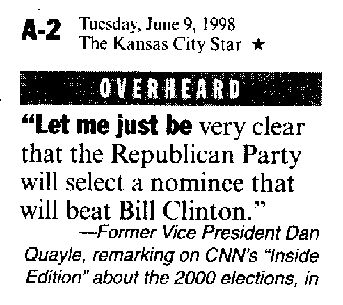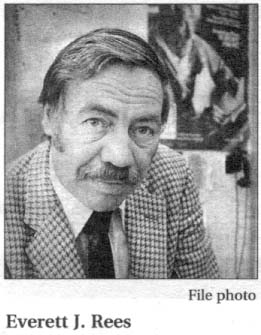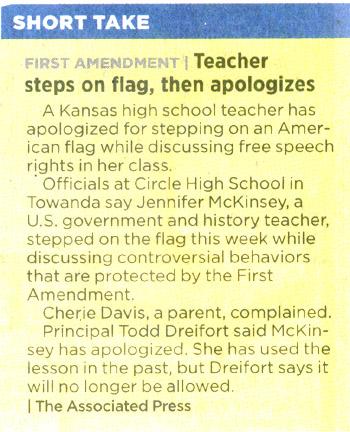| (This is why I brought you here.)
On February 27, 1951, the 22nd amendment to the U.S. Constitution
was ratified. It prohibits Bill Clinton from running for a third term, but Dan
forgot. Above is MSNBC's description about U.S. Senator Tuberville's misidentification of the three branches of government. Now, you might think that J. Danforth Quayle -- a lawyer and a former U.S.
congressman and a former U.S. senator and a former U.S. vice president -- would have a
better understanding of the Constitution. And you'd think that as a politician who
ran for president in 2000 (announced April 15, 1999) he'd realize that he would not face
Bill Clinton in the election. You'd think he'd have a pretty solid handle on the
fact that Clinton has bagged his limit of presidencies, but that's just Dan. At
least he got the year right this time. Still, his failure to appreciate the Constitution is not so rare. Consider the question of desecrating the U.S. flag. Dan is against it, and he supports an amendment (see sidebar at right) to the Constitution to allow prohibiting it. As I see it, so should any politician who wants to be able to say he's in favor of the U.S. So should any right-thinking, patriotic American who regards the flag not just as a piece of fabric but as the very symbol of our country. Oh, wait, I forgot about that darned Constitution, just like Dan did. Let me just look up something here . . . Yep, I was right. I knew it. I quote from the first of the ten rights in the Bill of Rights, i.e., the First Amendment to the Constitution of the United States: Congress shall make no law respecting an establishment of religion, or prohibiting the free exercise thereof; or abridging the freedom of speech, or of the press; or the right of the people peaceably to assemble, and to petition the Government for a redress of grievances. It's way too easy, I think, for most of us Americans to take our right to freedom of speech for granted. The phrase "free speech" has, for so many, lost its meaning through repetition. But the right to say what you want, especially the right to denigrate the government in power, is not all that common in the world, nor has it ever been. We Americans have gotten used to it, but in China, home to a fifth of the planet's population, if you complain about the government they will kill you, as the survivors of the hundreds of murder victims in the Tiananmen Square massacre in 1989 will attest (or would if they weren't afraid of being killed). According to an AP article in The Kansas City Star dated December 24, 1998: BEIJING--After the swift trials of three top democracy campaigners, President Jiang Zemin signaled Wednesday that China will continue its crackdown on dissent throughout next year. China Central Television quoted Jiang as saying, "Whenever any element that undermines stability raises it head, it must be resolutely nipped in the bud." Headlines. Headlines. Headlines. There are plenty more examples of how little free speech is respected in other parts of the world and even in the U.S. Do take a look at a few of the headlines I've collected, and read my comments if you want to, and then come back here. Indeed, in much of the world "free speech" is not just a familiar phrase nor is it just a concept that's taken for granted like air, it is a mostly highly prized but unattainable wish. In my opinion Americans' right to say what they want and particularly the press's right to publish what they want are responsible in large part for our success as a country so far. Sure, we have graft, and we have some slimy politicians, and we have a few law enforcement officers who violate their oath. But compared to most countries we have fastidiously clean government at all levels. In many countries graft is the norm, and in some countries the politicians are life-term dictators, and the civil law enforcement and even the military exist in part to suppress the very citizens whose natural rights as humans are denied by the dictator. And if you don't like it, tough. There's no one to complain to, and you can get killed for trying. And you can get stopped if you just plain try to leave. During the Cold War the government of East Germany, a country with extremely no free speech but lots of armed law enforcers, physically prevented its citizens from leaving, and until 1989 in East Berlin they had a literal wall, made of hardened concrete and patrolled by machine gunners, to keep 'em in. It's in large part because of Americans' freedom to say what we want that we do not live under the control of armed tyrants such as Saddam Hussein, the physically powerful but evil dictator of Iraq. Our government is specifically prohibited -- according to the very first amendment to the Constitution that created this country -- from passing any law that abridges our right to say what we want. As a result, we all of us have the right to dig up facts about people who govern poorly and rat 'em out to everyone we can. In a democracy that right to complain, that right to petition the government for a redress of grievances in a loud voice, results in the bad guys' getting caught and getting thrown out of office and maybe even into jail. If we don't have that right, and especially if the press doesn't have the right to speak for us in a really loud voice, then the corrupt and the tyrannical will thrive. The corrupt and the tyrannical hate a free press. Just ask Nixon. Or go here for several examples, then come back. So, if free speech is desirable and too-often taken for granted, what are we to think of flag-burning? Clearly, burning a flag is different from burning a pile of leaves. When you burn a U.S. flag you are making a statement of some sort. You are asking for the attention of your fellow citizens, and presumably you are hoping that you will effect some change in the government. When you burn a flag, you are exercising your right to speak freely, presumably against the very government represented by that flag. Here's what the Declaration of Independence says: We hold these truths to be self-evident . . . that to secure these rights [of life, liberty, and the pursuit of happiness], governments are instituted among men, deriving their just powers from the consent of the governed, that whenever any form of government becomes destructive of these ends, it is the right of the people to alter or to abolish it, and institute new government . . . [emphasis mine]. That was the whole idea the framers of the Constitution had in mind with that First Amendment. They didn't like it so much that King George Triple-I of England tried to prevent them from saying what they wanted to say and from gathering together to dis him and from having access to pamphlets and newspapers and MTV and the Internet and smart phones and tablets. They feared that if subjects of a ruling government couldn't complain out loud then the greedy and the evil, the corrupt and the tyrannical, would eventually take over. And it seems to have worked so far. In the U.S. we have not suffered under an evil dictator. Every president and every member of congress has been voted into office and can always have been voted out. Now it's true that for a good long stretch black men couldn't do any of that voting in or out. But that's fixed now. And it's true that for a good long stretch no color of woman could do any of that voting in or out. But that's fixed now too. And some say Franklin Roosevelt's four-term presidency was so dynastic as to be a problem, and that's fixed now too But no one said FDR or any other U.S. president was a greedy, evil, corrupt and tyrannical dictator who used bullets against the citizens under his rule to suppress their rights. (A little more detailed information about the three fixes above is in the sidebar at right. Hint: They're all amendments to the U.S. Constitution.) My English teacher in my senior year at Shawnee Mission East High School was a man I admired. Every couple months or so he would enter the classroom and, without speaking, pick up a new piece of chalk and turn it sideways, so it made a really fat line, and write across the entire width of the blackboard in the front of the room. The first time he did this he wrote the single word EXAMPLES in letters four feet tall and twenty feet wide and then he walked back out the door and didn't come back for two minutes. When he returned he explained that when you're doing expository writing, which is what this is, you should offer examples that prove your point. He went on to say that if you can't even invent plausible examples, it's not your writing that's lacking, it's your thinking. His class was an education in thinking disguised as an education in writing.
Update of July 2005: In the July 3, 2005, edition of Star Magazine, the color supplement to the Sunday Kansas City Star, there appeared an article on Mr. Rees guest-written by a former student. The headline is "The strictest, hardest and best teacher." I don't recall that he was particularly strict or hard, but he was without a doubt the best teacher I ever had. Although perhaps that was just by contrast. In my junior year my English teacher sent me to the assistant principal's office more than once for a persistent discipline problem. The problem was that she was embarrassed at how often I corrected her English in front of the class. You may be sure I never corrected Mr. Rees. Anyway, one other time when he did the sideways-chalk thing he wrote the following: The word is not the thing. Everett Rees was a critical thinker. Although words were his profession, he never trusted them because he knew how easily people are fooled by them. And he was all the time trying to demonstrate to his students how to avoid being fooled. He was a big fan of the truth, and he saw how the truth could be hidden by the artful but still fallacious manipulation of words. Mr. Rees had us read a good book titled Language in Thought and Action by S.I. Hayakawa. In fact, I think it's so good that in 1995 I sent paperback copies at $25 apiece to about eight people I know, just because I'm such a great guy. For you, get a copy from your library and read it, right now. Words are merely symbols, whether they exist orally or in print or in your mind. Because the word for a thing is not the thing itself -- whether that thing be a cow or Satan or patriotism -- it's important not to confuse the two. The word "Satan" is just a word. The word is not Satan himself, it's just a symbol we use to communicate the idea of the, er, actual Satan. The word is not the thing, it's just a symbol for what we mean by it. For example, if you eradicate the word evil from all newspapers and books and magazines and billboards and bus stop benches, and if you somehow prevent people from ever speaking the word or hearing the word or even thinking the word, you still have not affected the thing itself one iota. The thing itself, one symbol of which is the mere word evil, will remain unchanged, because the symbol is not the thing.
And read more HERE. The teacher was doing a good thing -- demonstrating that the symbol is not the thing. By treading on the flag she was showing that her students should always strive to distinguish between the symbol and the thing, but then a parent -- who presumably didn't understand the distinction -- complained, and for some reason or other the teacher apologized and no teacher at that school may now do what the good teacher did. To repeat, the U.S. flag is just a symbol of America. Eradicating that symbol, or prohibiting its eradication, doesn't change the thing that symbol represents. Desecrating a flag is not desecrating America. Or if it is, should we go ahead and prohibit, say, the public burning of someone's cardboard sign that reads as follows?
How are the flag and the cardboard sign different? Or consider the performance of controversial Irish-born, Roman-Catholic-raised singer Sinéad O'Connor on the Saturday Night Live broadcast of October 3, 1992, in which SHE finished a controversial song and then -- on-camera but almost entirely off-script -- produced a photograph of Pope John Paul II, held it in front of her face, tore it up, and dropped the pieces to the floor, saying, "Fight the real enemy." Should we prohibit the desecration of a photo? Despite whatever she might have meant by this extraordinary act, O'Connor meant something, and she meant to express it by desecrating an image of the image of the object of her dissatisfaction. Not the actual thing, mind you, but a mere image, a mere piece of paper, showing a mere image of a mere person who merely represents an organization. How about burning someone in effigy? How about publicly throwing darts at a picture of a presidential candidate? How about stabbing a signed photograph of O.J. Simpson? Should it be illegal for someone to display an image on a Web page of a U.S. flag on fire? If it is, I'll be happy to be the test case. Where does it end, and who says? Burning a flag is, as I say, nothing more than making a statement using a fabric symbol and fire. It's a radical statement in America, to be sure, but it's still a means of saying something, hence it's speech. And it is precisely that sort of speech that the very framers of the Constitution believed every American -- indeed, every human -- should be most free to express.
|
A
Quick Primer on Amendments Constitutional amendments should not be ratified for trivial or transitory reasons. They become the law of the land, as though they were part of the original Constitution. It is the Constitution, as amended, that all three branches of the U.S. government are obliged to obey, and it is the Constitution, as amended, that the justices of the U.S. Supreme court, the last hope of abused citizens, must adhere to, no matter what. And it's not like there's been a crescendo of flag-burnings here in the U.S. When was the last time someone desecrated a flag that you know about? Why should we actually amend the Constitution for such a silly reason? (Tip: If it looks like this amendment will pass, buy stock in a flag-making company.) Among the amendments since the full Constitution was adopted are the 13th, which abolished slavery; the 15th, which gave black men the right to vote; the 19th, which gave women the right to vote; the 22nd, which limited people to two terms as president; the 24th, which abolished poll taxes; and the 26th, which gave 18-year olds the right to vote. These are serious, heavy-duty changes to the original Constitution. Rights. These amendments broaden not the rights of the government but rather the rights of individuals. Restrictions. Said the other way, these amendments restrict not the behavior of individuals but rather the behavior of the government in power. In contrast, the 18th Amendment is instructive. The Prohibition Amendment (also known as the Volstead Act), put into effect in 1920, forbade the use of alcohol, i.e., it restricted the rights of individuals and gave the government more power. The 21st Amendment, ratified in 1933, repealed the 18th. The 21st Amendment gave rights back to individuals and restricted the power of government. The Prohibition amendment limited the rights of individuals, and after a 13-year-long experiment it was officially deemed a failure. (Note: It took something as momentous as an amendment to the U.S. Constitution to repeal something as momentous as an amendment to the U.S. Constitution. Lesson: Amending the Constitution is a serious matter.) Amending the Constitution to forbid citizens from performing an act such as desecrating the U.S. flag -- to limit their right, already granted in the very First Amendment, to free speech -- is an exceptionally extraordinarily serious matter, and it should not result from some politicians' desire to have or hold office for a few years by pandering shamelessly to the unthinking patriotic feelings of so many American voters. As I see it, any politician who votes for this amendment must also admit that he's willing to give up some piece, however small, of your right to say what you want and to hear whatever anyone else wants to say to you. As I see it, if you truly understand the Founding Fathers' original American values, you will recognize that amending the Constitution to prohibit flag-desecration is blatantly un-American. The Constitution is not to be toyed with, nor are the rights it bestows upon the subjects of the government it created, even if some of those subjects are not mindlessly nationalistic. To sum up, the proposed flag-desecration amendment to the Constitution of the United States should be rejected on any of these three grounds:
You might want to look at the OYEZ PROJECT site. When you're there, listen to the actual oral arguments in Texas v. Johnson, a 1989 U.S. Supreme Court flag-burning case in which the late William Kunstler (go straight to 24' 54" to hear him start) argues for the flag-burner. There are even a few laughs.
It might surprise you to learn that I don't bother to vote in presidential elections any more. The reason is simple. Undramatic, but simple: My one vote won't make a difference. Not even in Florida. Also, I think we should replace poll taxes with a Voting Aptitude Test. It would consist of two parts, one called Knowledge and the other called Common Sense. The higher you score on the VAT, the more your vote counts. As I see it, the votes of those people who are ignorant or unable to think well shouldn't count as much as those who aren't. For example, if you can't give some sort of explanation of the "separation of powers" elements of the Constitution, or if you base your vote on the candidates' horoscopes, your vote should count less than, say, mine. One final note on this subject: As far as the year 2008 goes, I decided yet again not to run for president of America. Maybe in 2010.
|


 At
right is an article from The Kansas City Star of September 10, 2011:
At
right is an article from The Kansas City Star of September 10, 2011: